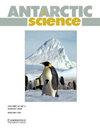What is the place of science in Antarctica?
IF 2
4区 地球科学
Q3 ENVIRONMENTAL SCIENCES
引用次数: 1
Abstract
TheAntarctic Treaty System (ATS) is often paraphrased as providing the means by which Antarctica is protected as a 'continent for peace and science', on the face of it meaning that the primary purpose of humans being present in Antarctica is for the advancement of scientific knowledge. As is well known, some of the earliest expeditions to Antarctica placed scientific discovery and exploration amongst their highest priorities. Scientific research in Antarctica really took off with the International Geophysical Year of 1957/58, illustrating that even then the importance of Antarctica in the global system and for the advancement of science was starting to be appreciated. Even today, the lack of knowledge of parts of the continent and surrounding ocean, and/or within particular disciplines, means that 'discovery science' still has a major role to play. With today's emphasis and focus on the multifaceted field of 'global climate change', it is often easy to forget that little more than 30 years ago the concept was barely mentioned or its importance widely appreciated. So, what were the major drivers of the rapid development of Antarctic science in the midto late-20 Century, before 'climate fever' took over, and to what extent do these still apply? Perhaps more provocatively, does science itself really drive the actions and plans of those nations operating in Antarctica, or is it more accurate to see 'the tail wagging the dog', with scientific priorities and cooperation trailing behind geopolitical manoeuvring and the maximising of national prestige within the ATS? Antarctica has always fascinated humans, whether scientists or not. From both scientific and personal perspectives, it provides some of the planet's extremes and superlatives. With most of the world's ice, lowest temperatures, importance as an upper atmospheric and space observatory and surrounded by the most powerful ocean current, it has long been central to glaciological, geological, tectonic, atmospheric and oceanographic studies. Its extreme environments quickly catalysed research into the evolution and exceptional survival abilities of its resident biota – remarkably diverse in the surrounding ocean and equally remarkably sparse on land, but both sharing very long-term histories in the region. There is still much to learn in all these fields, especially at the boundaries between traditionally distinct disciplines, in what used to be known as 'pure' research, or philosophical recognition of the value of knowledge itself. In today's world, Antarctica and the Southern Ocean play key roles as 'sentinels' for change across the globe, not only relating to climate, but also areas like pollution, erosion of biogeography, space weather and the importance of wilderness values. Their roles as the 'engine' for the global ocean circulation system and a key driver of global climate now take prominence. However, it could be suggested that researchers who cannot connect what they do in someway to 'climate change' are effectively disadvantaged in the increasingly intense world of competition for funding. A widely used tenet of the ATS is that it prevents economic exploitation of Antarctica, but studies in the field of bioprospecting are now accelerating rapidly, while discussions regarding its regulation have stalled over many years in the ATCM and it is now probably too late to shut that stable door (Hughes & Bridge 2010; Joyner 2012). The still largely taboo question of what exploitable mineral resources there are in Antarctica and, if they are there, when and how might they be exploited, has not gone away and it is clear that some Treaty Parties have it actively in their sights (e.g. see https://oilprice.com/Energy/Crude-Oil/Russia-Makes-Move-On-Antarcticas-513-BillionBarrels-Of-Oil.html; https://www.upstreamonline.com/politics/cold-war-russian-research-ship-at-centre-ofantarctic-oil-and-gas-prospecting-storm/2-1-1397780; Talalay & Zhang 2022) As with the rest of both our personal lives and national economies, global realities in the early decades of the Twenty-first Century are already leading to important reconsideration of how science is achieved in Antarctica. This could be in terms of how we prioritise the science that is actually done (and who is given the privileged position to do so), how we assess and control our direct environmental impact, how we can develop and apply realistic and honest ways of assessing and controlling our carbon budgets and make our activities as 'green' as possible, or how and what we 'value' in the science generated from Antarctica. There is increasing pressure towards application, where possible, of remote sensing and related approaches to obtaining required data from Antarctica and thereby reducing the direct human footprint. However, seemingly paradoxically, multiple nations have recently, are now, or soon will be engaged in major station reconstruction and expansion programmes, or the construction of entirely new stations or logistic facilities (e.g. airstrips). doi:10.1017/S095410202300007X科学在南极洲的地位是什么?
然而,看似矛盾的是,多个国家最近、现在或很快将参与大型车站重建和扩建计划,或建造全新的车站或后勤设施(如飞机跑道)。doi:10.1017/S095410202300007X
本文章由计算机程序翻译,如有差异,请以英文原文为准。
求助全文
约1分钟内获得全文
求助全文
来源期刊

Antarctic Science
地学-地球科学综合
CiteScore
3.60
自引率
6.20%
发文量
42
审稿时长
3 months
期刊介绍:
Antarctic Science provides a truly international forum for the broad spread of studies that increasingly characterise scientific research in the Antarctic. Whilst emphasising interdisciplinary work, the journal publishes papers from environmental management to biodiversity, from volcanoes to icebergs, and from oceanography to the upper atmosphere. No other journal covers such a wide range of Antarctic scientific studies. The journal attracts papers from all countries currently undertaking Antarctic research. It publishes both review and data papers with no limits on length, two-page short notes on technical developments and recent discoveries, and book reviews. These, together with an editorial discussing broader aspects of science, provide a rich and varied mixture of items to interest researchers in all areas of science. There are no page charges, or charges for colour, to authors publishing in the Journal. One issue each year is normally devoted to a specific theme or papers from a major meeting.
 求助内容:
求助内容: 应助结果提醒方式:
应助结果提醒方式:


